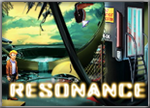A quick thanks to VT for giving me the thumbs up to add to the awesome. What I have to offer is mostly theoretical in nature, based on some of the work I did for my Game Design course at Carnegie Mellon University, taught by Disney Imagineer Jesse Schell.
One thing that Jesse mentioned was the importance of introspection in game design, and I can’t dispute that. Anna is a combination of Vince’s past experiences put together in one great game – and I think most game designers work that way. On the other end of the spectrum, my studies in human-computer interaction (HCI) push the mantra: “The user is not like me.” Reconciling that mantra with introspection is difficult to manage sometimes, but I don’t think that the answer is to simply default to introspection.
Exploring further, I think HCIers and game designers are similar in a lot of ways. They both have (or gain) a large amount of knowledge and understanding in their respective fields (we hope). Both are inherently multidisciplinary, drawing heavily from psychology, anthropology, and design. So why do they diverge on this point? Is it because of HCI’s roots in science? Partially, but I think there’s a fundamental truth that applies to both disciplines: No matter how much HCIers know about usability, they don’t necessarily understand their users. Similarly, game designers certainly know plenty about games, but they don’t necessarily understand gamers.
This statement doesn’t always hold. In the case of designing Anna, Vince was designing a game for an audience that, at its core, shared a lot in common with him. The gamer was, in fact, like him. But, I would argue that if Vince were to design a football game as game #3, he would gain a lot from watching people play football video games and understanding them from a typical gamer’s point of view.
So I guess the point isn’t to pick one direction over the other, but instead to strike a balance. The HCI mantra warns HCI professionals against being complacent in their knowledge of usability, and acknowledging the (many) areas where they aren’t experts. This risk holds for game designers too – so don’t be afraid to seek a little external motivation along the way.



